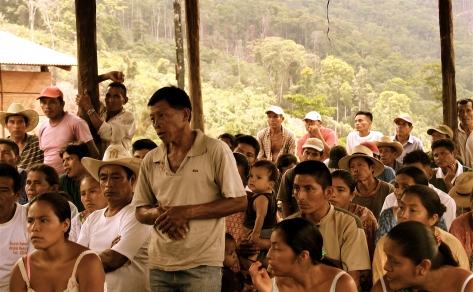DominionSections
Browse Articles
- IndependentMedia.ca
- MostlyWater.org
- Seven Oaks
- BASICS Newsletter
- Siafu
- Briarpatch Magazine
- The Leveller
- Groundwire
- Redwire Magazine
- Canadian Dimension
- CKDU News Collective
- Common Ground
- Shunpiking Magazine
- The Real News
- Our Times
- À babord !
- Blackfly Magazine
- Guerilla News Network
- The Other Side
- The Sunday Independent
- Vive le Canada
- Elements
- ACTivist Magazine
- The Tyee
- TML Daily
- New Socialist
- Relay (Socialist Project)
- Socialist Worker
- Socialist Action
- Rabble.ca
- Straight Goods
- Alternatives Journal
- This Magazine
- Dialogue Magazine
- Orato
- Rebel Youth
- NB Media Co-op
Radio
Guatemala 6
August 17, 2010
Guatemala 6

One man, Raul, did most of the talking in his native Qeqchi, which was translated into Spanish by our liaison, and then into English by our guide. Raul’s son, about twenty years old, translated for his father into Spanish. Clear and passionate, Raul's son spoke as if the words were his own. Others added details from time to time, but most fell silent and listened, as we did, to their history. Occasionally we would meet eyes, and smile, nod our heads. The story was tragic. They spoke of ancient ties to this land. The land, their mother, their bearer of corn and culture; they would defend her at all costs. Denied their "own" land (under Western standards of ownership) they were renters, sharecroppers in a way, living on a large finca (farm) whose owner eventually sold the estate to EXMIBAL. Leaders from their community were assassinated for demanding their rights to the land. Negotiations with the companies were always sketchy; officials did not want to provide full documentation of rent payments, which were paid in full for more than 40 years. Sometimes it appeared that the community might win, that they could buy the land outright—a small corner of tremendously rugged terrain. But 2004 was a bad year for all Maya-Qeqchi communities surrounding Izabal. There might be a market for nickel after all, stated revised predictions, graphs and spreadsheets. Soon enough, Skye Resources Incorporated said the global demand would equal the investment needed to reopen the plant in El Estor. On January 9, 2007, hundreds of police, military, and company guards arrived at Lote 8 after burning down a nearby village “They gave us five minutes to leave,” Raul told us, “and 300 Quetzales [equal to USD$37] to take down our own homes.”
by Nathan EinbinderArchived Site
The Dominion is a monthly paper published by an incipient network of independent journalists in Canada. It aims to provide accurate, critical coverage that is accountable to its readers and the subjects it tackles. Taking its name from Canada's official status as both a colony and a colonial force, the Dominion examines politics, culture and daily life with a view to understanding the exercise of power.